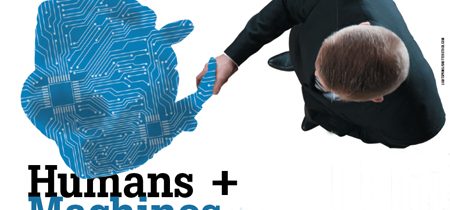Humans + Machines = Exponential Improvements
Content was pulled from MHI Solutions Magazine Q2.2019
When MHI member Vecna Robotics first went to a FedEx facility to introduce its robots there, a worker reacted less than enthusiastically to the arrival of the new technology. The man approached Vecna representatives, according to Daniel Theobald, co-founder and CIO at Vecna, and said, “Oh, great, robots. When are we getting our pink slips?”
Theobald said the worker’s initial response was an understandable one. Robotics and other types of advanced technology not only can serve to improve the efficiency and productivity of overall supply chain operations but can “supercharge” the productivity of individual workers, allowing them to better reach their potential, Theobald said. However, the benefits for workers are not always immediately evident—and some organizations have introduced technology with the aim of replacing workers. It’s no wonder workers often are suspicious of advanced technology and wary that its arrival could signal trouble, Theobald said.
Still, Alan Prillaman, senior director of consulting services for MHI member Open Sky Group, said advanced technology has led to worker productivity improvements “at virtually every stage of the supply chain, impacting all levels from senior leadership down to distribution fulfillment operators.” Technologies such as prescriptive analytics and business intelligence tools help improve demand planning, capacity management, inventory optimization and network design, and high-tech tools such as robotics and the Internet of Things allow for the creation of a demand-driven, flexible workforce.
Prillaman said these improvements depend on organizations taking an approach that recognizes both the advantages and limitations of advanced technology solutions.
“Technology and automation should be developed and utilized with the primary objective of enhancing human activities, safety and experiences—not to try to replace the most powerful creative machine ever created: the human brain,” Prillaman said.
Fergal Glynn, vice president of marketing at MHI member 6 River Systems, said advanced technology can serve to guide workers through a more efficient workday. In the warehouse, for instance, through automated picking and intelligently grouping orders, technology can help workers cut down on wasted effort. Consequently, workers walk shorter distances over the course of a shift and exert less physical strain, while handling more orders and getting more stuff out the door in a day. Glynn said workers also get their orders right at much higher rates as technological assets help prevent picking the wrong items.
Theobald said helping workers spend their time and energy more efficiently is the most crucial piece of technology’s value—not its ability to complete work in place of people.
Read full article in MHI Solutions Magazine





